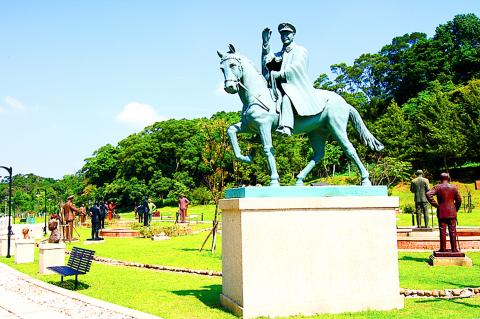The Executive Yuan is to immediately establish an ad hoc commission for the promotion of transitional justice to disclose historical data and remove authoritarian symbols, Premier William Lai (賴清德) said yesterday.
The Legislative Yuan on Tuesday approved the Act on Promoting Transitional Justice (促進轉型正義條例) and Lai yesterday instructed Minister Without Portfolio Lo Ping-cheng (羅秉成) to establish such a committee by nominating a list of members, drafting the organizational regulations and planning a budget.
“The establishment has to be completed in the shortest time possible to meet public expectations for transitional justice and reconciliation,” Lai said.

Photo: CNA
The passage of the act is a milestone in the nation’s democracy and has pivotal importance in the nation’s history, he said.
The committee would be responsible for making political archives available, removing authoritarian symbols, redressing judicial injustice and investigating political persecution, Lai said.
Asked if roads and schools named after former president Chiang Kai-shek (蔣介石) would be renamed, and coins and notes bearing his portraits recalled following the act’s passage, Lai said the committee would have sole discretion.
“It will be fully authorized to make investigations, file reports and make [decisions],” Lai said.
Before the committee is established, it is premature to comment on the treatment of symbols of Chiang, he said.
Executive Yuan spokesman Hsu Kuo-yung (徐國勇) said the establishment of the committee would not be as swift as was the case with the Ill-gotten Party Assets Settlement Committee, because its members did not need to be approved by the Legislative Yuan while transitional justice committee nominees do.
Meanwhile, the Presidential Office said it is illogical to debate whether roads and schools should be renamed until the truth about the nation’s history is understood.
Following the passage of the act, some people have deliberately misinterpreted it and spread misinformation that the government is planning to redesign the nation’s currency, and rename roads and schools, the office said.
Presidential Office spokesman Alex Huang (黃重諺) said there are multiple ways to remove authoritarian symbols, including simple removal and renaming as well as preservation and reconstruction.
The act requires the government to investigate improper criminal proceedings and human rights violations during the authoritarian era and to reinstate the rights and reputations of victims of political persecution, Huang said.
That work would be undertaken by the transitional justice committee, Huang said.
“There should be a list of priorities. Before the investigation of historical truth is completed, before the responsibilities for improper criminal proceedings and human rights violations are ascertained, how can any measures [such as renaming schools] be put forward?” he said.

CHAOS: Iranians took to the streets playing celebratory music after reports of Khamenei’s death on Saturday, while mourners also gathered in Tehran yesterday Iranian Supreme Leader Ayatollah Ali Khamenei was killed in a major attack on Iran launched by Israel and the US, throwing the future of the Islamic republic into doubt and raising the risk of regional instability. Iranian state television and the state-run IRNA news agency announced the 86-year-old’s death early yesterday. US President Donald Trump said it gave Iranians their “greatest chance” to “take back” their country. The announcements came after a joint US and Israeli aerial bombardment that targeted Iranian military and governmental sites. Trump said the “heavy and pinpoint bombing” would continue through the week or as long

TRUST: The KMT said it respected the US’ timing and considerations, and hoped it would continue to honor its commitments to helping Taiwan bolster its defenses and deterrence US President Donald Trump is delaying a multibillion-dollar arms sale to Taiwan to ensure his visit to Beijing is successful, a New York Times report said. The weapons sales package has stalled in the US Department of State, the report said, citing US officials it did not identify. The White House has told agencies not to push forward ahead of Trump’s meeting with Chinese President Xi Jinping (習近平), it said. The two last month held a phone call to discuss trade and geopolitical flashpoints ahead of the summit. Xi raised the Taiwan issue and urged the US to handle arms sales to

State-run CPC Corp, Taiwan (CPC, 台灣中油) yesterday said that it had confirmed on Saturday night with its liquefied natural gas (LNG) and crude oil suppliers that shipments are proceeding as scheduled and that domestic supplies remain unaffected. The CPC yesterday announced the gasoline and diesel prices will rise by NT$0.2 and NT$0.4 per liter, respectively, starting Monday, citing Middle East tensions and blizzards in the eastern United States. CPC also iterated it has been reducing the proportion of crude oil imports from the Middle East and diversifying its supply sources in the past few years in response to geopolitical risks, expanding

Pro-democracy media tycoon Jimmy Lai’s (黎智英) fraud conviction and prison sentence were yesterday overturned by a Hong Kong court, in a surprise legal decision that comes soon after Lai was jailed for 20 years on a separate national security charge. Judges Jeremy Poon (潘兆初), Anthea Pang (彭寶琴) and Derek Pang (彭偉昌) said in the judgement that they allowed the appeal from Lai, and another defendant in the case, to proceed, as a lower court judge had “erred.” “The Court of Appeal gave them leave to appeal against their conviction, allowed their appeals, quashed the convictions and set aside the sentences,” the judges